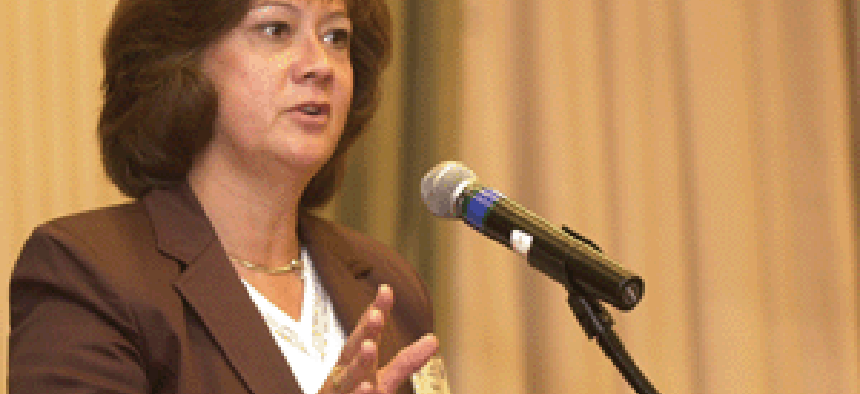Consolidation answers coming

The Office of Personnel Management and the Office of Management and Budget by the end of the December will have answers to some of the biggest questions surrounding the lines-of-business consolidation initiatives.
The Office of Personnel Management and the Office of Management and Budget by the end of the December will have answers to some of the biggest questions surrounding the lines-of-business consolidation initiatives.OPM will issue minimum service-level agreement metrics for Human Resources Management Centers of Excellence. OMB is in the final stages of determining who would pay for transition costs when agencies switch from one shared service provider to another.Both of these issues are part of a larger lines-of-business puzzle that slowly is coming together. During fiscal 2006, officials expect to see a lot of activity around lines-of-business consolidation. Agencies will migrate to Centers of Excellence, the private sector will begin participating in the centers, and the government will begin setting standards for human resources systems and approving vendor software that meets those requirements."We want to look at whether these functions such as financial management are core to the agencies' mission, or should they spend money to get data from a shared service provider," said Karen Evans, OMB's administrator for E-Government and IT, at a recent luncheon sponsored by the Association for Federal Information Resource Managers in Washington. "We really want people to look at this, and we will work with them as they move forward."Evans said OMB is working on procurement language on how to deal with the cost of transitioning from one Center of Excellence to another when an agency's needs are not being met. The provider also likely would have to pay the cost to get rid of an agency if it is a bad customer, she said."We are considering making the service provider that is not meeting the agency's needs bear the cost," Evans said. "We need clear language in the service-level agreements, so providers and agency customers know what is expected of them."That is where OPM comes in, at least for human resources.Norm Enger, OPM's e-government program director, said a working group will draft a minimum service-level agreement template for all Centers of Excellence."Agencies can add more specifics in their own [service-level agreements] but these are the basic levels that the Centers of Excellence must meet," he said at the E-Gov Institute's 5th annual Enterprise Architecture Conferences in Washington. "We are looking at the criteria for what good customer service is as well as the application of performance metrics."The service-level agreement template will come just in time, as OMB expects large agencies to begin migrating to Centers of Excellence in 2006. Although there is no stated goal for the number of human resources migrations, Evans said she expects at least three large agencies to migrate to a financial management Centers of Excellence.Evans said some small agencies already have migrated to financial management Centers of Excellence, including the National Gallery of Art, the Federal Housing Finance Board, the Institute of Museum and Library Sciences and OPM.The Homeland Security and Housing and Urban Development departments are among the large agencies considering moving to a human resources shared-service center.OMB estimated that the government will save $5 billion through 2015 through the human resources and financial lines of business.OMB also is tracking the cost savings from the original 25 e-government initiatives by using earned-value management methodology, which measures the value of the work on a project, Evans said.Enger said the Human Resources Line of Business task force also will publish a series of architecture documents by Dec. 31.The first set of documents will be the framework for HR systems:requirements for compensation, re-quirements for benefits, and requirements for personnel processing actions. "These will talk about the business process requirements or the framework for the systems," Enger said. "It is part of the HR Management Improvement Program so we can test and certify vendor software."Enger said the task force eventually would tackle six other sets of requirements documents, including HR strategy and employee relations.The HR Management Improvement Program should be in place and certifying vendor applications by late 2006 or early 2007, Enger said.The task force also is working on the first ever data-reference model for human resources and payroll. Enger said it should be finished by the end of the year.The HR Management Improvement Program will define data elements derived from the business processes, Enger said."We want to move to a commonality to describe something," he said. The data-reference model "also will show what the value variations could be. This is getting people to talk about HR and payroll data in the same terms."The HR improvement program follows the task force's work last year constructing a HR business reference model.OMB also wants vendors to participate next year as shared service providers in the lines of business for human resources and financial management.Evans said that, for starters, the private sector should use the due diligence checklist that the lines-of-business task force developed. OMB also will release guidance on how the process will work, she said.John Sindelar, program executive for OMB's lines-of-business effort, said at the Enterprise Architecture Conference that the due diligence checklist likely will become part of larger contractual action, such as a request for proposals.OMB also is deciding whether contracting with a private sector Center of Excellence would count toward the agency's President's Management Agenda scorecard rating for competitive sourcing.Jason Miller is assistant managing editor for news at Government Computer News. He can be reached at jmiller@postnewsweektech.com.


"We need clear language in the service-level agreements, so providers and agency customers know what is expected of them." ? Karen Evans, OMB's administrator for E-Government and IT
NEXT STORY: Telecoms ride to the rescue

